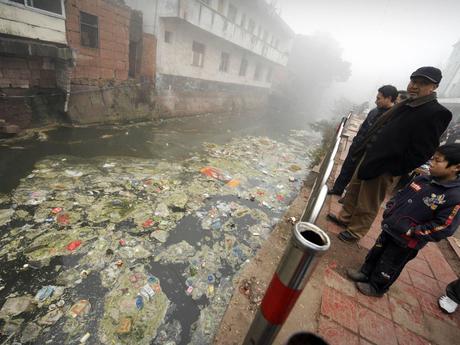
By RP Siegel / Triple Pundit
Given our heavily business-friendly Congress, who believes that the best thing they can do for Americans is to cut taxes and reduce regulations; it should not be surprising to find a somewhat laissez-faire attitude toward polluters. Occasionally, people go to jail for environmental crimes, but that is relatively rare. More commonly, civil penalties and fines are involved.
That is not always the case in other parts of the world. In the EU, for example, environmental regulation is one of the most important and far-reaching aspects of their legislation. Penalties vary by country, but jail terms and substantial fines are common and often more severe than in the US.
But, by far the most severe is China. In what appears to be a clear case of “desperate measures for desperate times,” Chinese authorities have recently given courts the authority to hand down the death penalty for serious cases of pollution. This is apparently in response to public outrage over the despoliation of the environment.
The new reading of the law would enact harsher punishment, tightening what that official Xinhua announcement called, “lax and superficial enforcement” of laws that were already on the books. In the case of the most serious crimes, the death penalty could be given.
Public anger over China’s growth-at-all-costs policies has been growing steadily in response to the increasingly polluted air and water. A new survey, carried out by the Public Opinion Research Centre in collaboration with Shanghai Jiao Tong University, measuring the public’s attitudes towards environmental protection found that up to 80 percent believe that environmental protection should be a higher priority than economic development.
There is good reason for this concern. A recent analysis by the Health Effects Institute in Boston found that over a million people die prematurely in China every year as the result of air pollution.
Particulate levels in Beijing, Guangzhou and other Chinese cities often rise to as much as seven times the World Health Organization’s air-quality standard, or twice China’s own less stringent limits. Pollution from factories in the Pearl River Delta have created a dead zone that stretches several miles from the river’s mouth out to sea.
There is a bit of an irony in the fact that the pro-growth policy that emerged with the idea of bringing widespread prosperity as an antidote to the Tienanmen-type social unrest, has now led to levels of pollution so severe that it has led to unrest.
A protest over plans to build a petro-chemical refinery in Kunming in Yunnan province back in May is considered by many to be the tip of the iceberg. The proposed plant would process 10 million tons of crude oil and 500,000 tons of carcinogenic paraxylene, used in the production of plastic bottles. Some 2,500 people took to the streets.
The new penalties are clearly the act of a government that feels itself caught between a rock and a hard place. It’s difficult to say what impact the new penalties will have, but it certainly does indicate that the government is taking the environmental concerns of its citizens seriously.
[Image credit: Andy Enero: Flickr Creative Commons]
RP Siegel, PE, is an inventor, consultant and author. He co-wrote the eco-thriller Vapor Trails, the first in a series covering the human side of various sustainability issues including energy, food, and water in an exciting and entertaining romp that is currently being adapted for the big screen.

